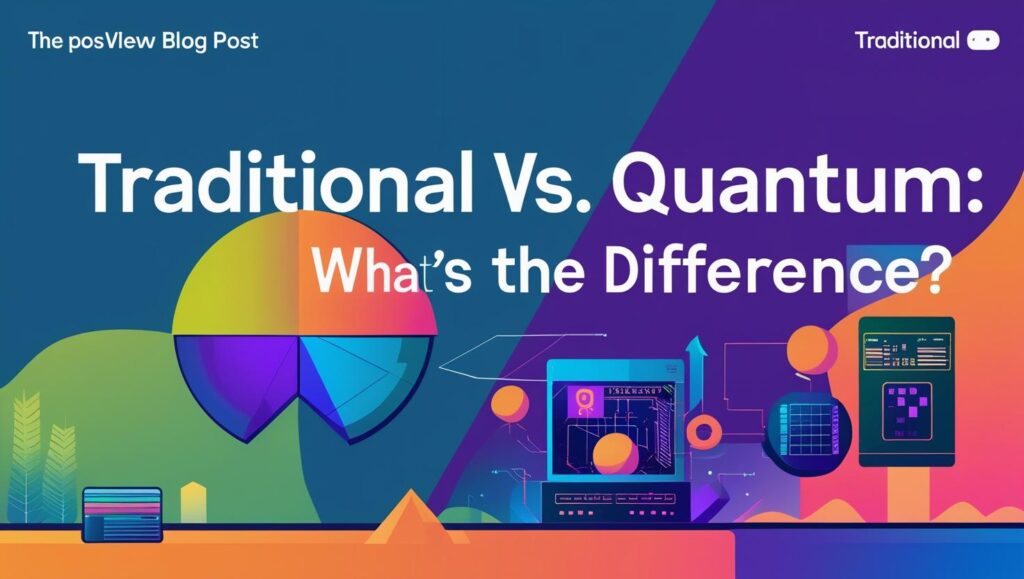
Introduction: Why You Keep Hearing About Quantum Computing?
If you’ve been noticing the term “quantum computing” appear in tech news, scientific advancements, or even sci-fi movies, you’re not alone. But why is everyone talking about it?
Quantum computing is being viewed as one of the most revolutionary technologies of the 21st century, and for good reason. Traditional computers use bits, which are ones and zeros, to process information. Quantum computers, on the other hand, use qubits. These can exist as both 1 and 0 simultaneously. Sounds wild, right? This unique feature allows them to tackle incredibly complex problems that would take the fastest supercomputers thousands of years to solve.
The reason you’re hearing so much about it now is that we’re getting closer to making quantum computing practical. Tech giants like Google, IBM, and Microsoft are competing to develop powerful quantum processors. Governments are investing billions. Startups are emerging with ambitious promises. Researchers are achieving breakthroughs nearly every month.
But here’s the exciting part: quantum computing isn’t just for laboratories or scientists in white coats. It could soon affect everything from cybersecurity and medicine to finance, climate science, and AI. Whether it’s designing new drugs in seconds, optimizing supply chains globally, or cracking encryption codes, quantum computers could reshape the world as we know it.
In this blog post, we’ll break down what quantum computing really is, why it matters, and how close we are to seeing it change our everyday lives.

Traditional vs. Quantum: What’s the Difference?

To understand why quantum computing is so important, you need to know how it differs from the traditional computers we use every day—your laptop, your phone, or even the servers that run Google.
Traditional Computers: The Digital Workhorses
Traditional computers are based on binary code—a system of 1s and 0s. Every action you take online, every video you watch, and every photo you upload is broken down into a series of these bits. A bit can only be in one state at a time: either 1 or 0. All the computing power you see today—from smartphones to supercomputers—relies on this basic structure. It’s fast, reliable, and has changed the world. But it has its limitations.
Quantum Computers: The Mind-Blowing New Arrival
Now this is where things get weird—but exciting—. Quantum computers use qubits instead of bits. A qubit can be 1, 0, or both at the same time—thanks to a weird property in quantum physics called superposition. And that’s not all. Qubits can also influence each other instantaneously through entanglement, another quantum phenomenon that sounds like science-fiction but is very real.
What does this mean in practice? This means that quantum computers can explore millions of possibilities simultaneously, while traditional computers consider a single option at a time. Imagine you’re trying to find the shortest route through 100 cities. A traditional computer would examine every possible path one by one. A quantum computer can analyze thousands—or even millions—of paths simultaneously.
Speed vs. scale
Traditional computers are better for everyday tasks like browsing, editing documents, or gaming. Quantum computers aren’t meant to replace them—they’re designed to solve extremely complex problems in areas like cryptography, drug development, logistics, and artificial intelligence, where traditional systems run into trouble.
So, the main differences? Bits vs. qubits.
One step at a time vs. millions of steps at once.
Classical certainty vs. quantum weirdness—and power.
In the world of computing, traditional technology is like a flashlight in a dark room—efficient and focused. Quantum technology is like lighting up the whole room at once.
Next, let’s explore how this amazing technology could soon impact your world.

What Can Quantum Computers Actually Do?
You might be thinking, “Okay, quantum computers sound amazing and powerful—but what can they actually do?” That’s a great question. The truth is that quantum computers are still in their early stages, but they have the potential to solve problems that classical computers simply can’t solve—or that would take millions of years to figure out.
Let’s look at some real-world examples of where quantum computers could have a huge impact:
Revolutionizing medicine and drug discovery
Imagine you’re trying to understand how the molecule of a new drug interacts with every cell in your body. It’s extremely complex—like predicting the weather for every inch of the Earth forever. Classical computers struggle with this level of detail, but quantum computers can simulate these interactions at the atomic level, which could help scientists find new treatments or cures for diseases faster than ever before.
Breaking (or reinventing) cybersecurity
Today’s encryption methods protect your online data by using incredibly complex mathematical puzzles. These are nearly impossible for traditional computers to solve in a reasonable amount of time. But quantum computers could break some of these systems in minutes. It’s scary—but that’s why researchers are now working on quantum-safe encryption to protect our digital future.
Optimizing complex systems
Think of global shipping routes, airline schedules, or supply chains during a pandemic. They involve thousands of moving parts and variables. Quantum computers can analyze all possible combinations simultaneously to find the most efficient, cost-effective, or time-saving solution—something that traditional computers can only guess at.
Climate modeling and materials science
Understanding climate patterns or creating new eco-friendly materials involves extremely detailed physics calculations. Quantum computers can run simulations that are too complex for today’s systems—helping us design better batteries, cleaner fuels, or even materials we haven’t even imagined yet.
Supercharging artificial intelligence
Quantum algorithms can significantly boost machine learning by handling huge datasets and learning patterns faster than ever before. This means smarter AI, faster training of models, and better predictions in fields like finance, healthcare, and robotics.
In short: quantum = possibilities
Quantum computers aren’t just “faster computers.” They’re an entirely different kind of machine—built for challenges that break the limits of traditional technology. Though we’re still a few years away from everyday use, the possibilities are amazing.
So the next time you hear about quantum computing in the news, you’ll know it’s not just hype—it’s a glimpse into the future of problem-solving at a whole new level.
Why Isn’t Everyone Using It Yet?
After hearing about all the incredible things that quantum computers can do—like solve impossible problems, cure diseases faster, or supercharge AI—you might be wondering: “If quantum is so powerful, why aren’t we all using it now?” The answer? Because building and using quantum computers is really, really hard.
It’s still experimental
Quantum computing isn’t like buying a laptop off the shelf. These machines are still in the early stages of development. Most quantum computers these days are housed in high-tech labs, and look more like futuristic chandeliers hanging from giant refrigerators than anything computer-like.
Why this weird setup? Because qubits—the heart of quantum computers—are extremely sensitive. The slightest amount of heat, noise, or motion can disrupt their delicate state. So scientists have to cool them to near absolute zero (colder than space!) and isolate them completely to get them to work.
Hardware is still evolving
Right now, quantum computers don’t have enough stable qubits (called “error-corrected qubits”) to do all the amazing things they promise. Most existing machines can only perform small experiments or simple tasks. Building bigger, more powerful quantum computers is like stacking cards in a storm—it requires extreme precision and is fraught with challenges.
Not a replacement for your laptop
Quantum computers aren’t meant to replace your everyday devices. They’re designed for very specific, extremely complex problems, not for checking email or scrolling Instagram. So you won’t see any “quantum MacBooks” anytime soon. Instead, they’ll likely work behind the scenes in industries like medicine, logistics, finance, and defense.
A whole new way of thinking
Quantum computing also requires entirely different programming languages and problem-solving techniques. Developers and researchers are still learning how to write “quantum software,” which is nothing like traditional code. That means we also need time to train a whole new generation of quantum programmers.
In short: We’re getting there—but it’s complicated
Think of quantum computing like the early days of electricity or the internet. Its potential is enormous, but the path to making it useful for everyone is filled with scientific, technological, and educational hurdles. But progress is being made—rapidly. Big tech companies, universities, and governments are pouring billions of dollars into quantum research.
So no, we’re not using it every day yet. But when will we? That could change everything.

The Road Ahead: Quantum in the Next 5–10 Years
So where is all this hype around quantum leading? Will we be using quantum apps on our phones in the next decade? Probably not—but that doesn’t mean nothing is happening. In fact, the next 5 to 10 years could be the most exciting and important years of the whole quantum journey.
From labs to real-world impact
Right now, quantum computers exist mostly in research labs and the high-security data centers of tech giants. But in the next few years, we’ll start to see their power move out of the lab and into real-world applications. Early quantum machines will begin solving problems in drug discovery, logistics, finance, and chemistry—often behind the scenes, combined with traditional computers using a technique called hybrid computing.
This means a typical company may not need a quantum computer—but it can solve problems faster than ever before by using quantum-powered cloud services.
Better Qubits, Less Noise
One of the biggest hurdles today is that quantum computers are still noisy and error-prone. But researchers are in a race to build error-corrected quantum systems—machines that can perform long, reliable calculations without the slightest glitch.
In 5-10 years, we’ll likely have quantum hardware that will be far more stable, scalable, and powerful, bringing a whole new level of utility to life.
Quantum-as-a-Service
Just as you don’t need a supercomputer to use Google or Netflix, we won’t need a quantum computer to harness its power. Companies like IBM, Google, and Amazon are already offering quantum-as-a-service (QaaS)—where you can access quantum machines through the cloud.
This trend will grow, making quantum computing more accessible to startups, researchers, and even curious developers. Think of this as the “early internet phase” of quantum—few players, but growing fast.
A new generation of quantum talent
As demand grows, so will the need for quantum-savvy professionals—scientists, engineers, and developers—who understand this new technology. In fact, universities and online platforms are already creating quantum courses, coding bootcamps, and even entire degrees focused on quantum technologies.
So if you’re a student or tech enthusiast reading this right now—you’re at the very beginning.
Summary: We’re building the future now
The next 5-10 years won’t make quantum computers household gadgets, but they will make them practical, useful, and a part of solving humanity’s toughest problems. Slowly (or rather qubit by qubit), we’re moving toward a world where quantum isn’t just something we read—it’s something we rely on.
So keep your eyes on quantum. Because the future isn’t just digital anymore – it’s quantum.
Final Thoughts: Why It Matters
With all that we’ve discovered—how quantum computing works, what it can do, and where it’s headed—you may still be wondering: “If quantum computing isn’t even fully developed yet, why should I care about it now?” And that’s a fair question.
The truth is: quantum computing isn’t just another technology trend. It’s a paradigm shift in the way we understand and use technology to solve problems that affect the entire world.
Imagine being able to treat diseases faster, predict natural disasters more accurately, design climate-friendly materials, or make new scientific discoveries—all thanks to new discoveries in the quantum field. It’s not just about faster machines. It’s about transforming the possibilities of computing.
Even if you never personally touch a quantum computer, its effects will reach you—through better healthcare, smarter AI, safer data, and more efficient systems around you. Just as most people don’t need to understand how the internet works to benefit from it, quantum will quietly form the backdrop for many life-changing innovations in the years to come.
Preparing for a Revolution
Quantum computing is important because it’s part of a much larger movement—the next evolution of technology. It pushes the boundaries of science, challenges our understanding of reality, and opens doors we didn’t know existed.
And the most exciting part is this: we’re witnessing this revolution from the ground up. In a few years, people will remember this moment the same way we remember the early days of the internet or smartphones today—when things were just getting started, and few people truly understood what was coming.
So, why is quantum computing important?
Because it has the power to transform industries, science, and society.
Because it’s not just about what we can do today—it’s about what we’ll be able to do tomorrow.
And that future? It’s already in the making.
